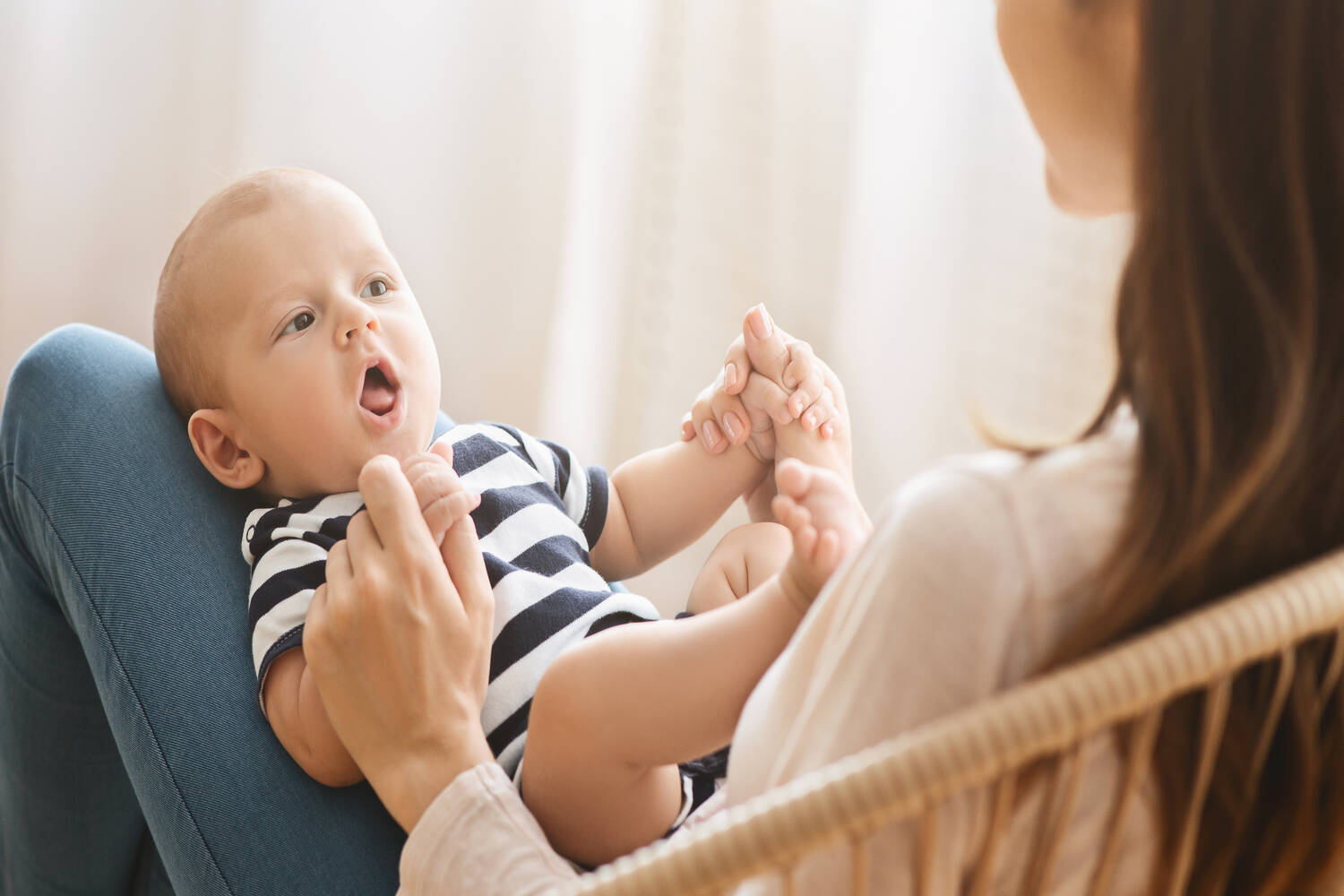
Many people express affection towards babies through a unique style of speech characterized by simple vocabulary and playful sounds. Referred to as “baby talking,” this form of communication serves as a means of bonding and is prevalent across cultures. It is both informal and amusing yet aids babies’ speech development.
Moreover, some parents consider ‘parentese’ or intentional and purposeful baby talk that is more formal as a better option for developing language acquisition in babies. Hence, the debate between ‘baby talking’ and ‘parentese’—what’s your pick? continues….
In This Article
- What is Baby Talk?
- Why is Baby Talking With Babies Popular?
- Effects of Baby Talking on Baby’s Development
- What is The Alternative Way to Communicate With Babies?
- Tips For “Adult Talk With Your Baby”
- FAQs
What is Baby Talk?
The use of silly sounds and nonsensical words is a great way to connect with babies, as they can absorb the emotions of parents easily. For most adults, baby talking is a unique communication style that is used by parents and caregivers with babies who cannot use words to express themselves. It involves repetition of words, silly sounds, and substituting the actual word with something funny.
Some of the examples of baby talking are saying ‘foo’ for ‘shoe’ or using nicknames like ‘boo-boo’ for milk, or not using the real names for objects that are already familiar to the baby. Examples are – ‘danchi’ instead of ‘dance’ or saying ‘sing-songy’ instead of ‘sing-a-song’.
Research findings have shown that baby talking is exclusively infant-directed and it helps enhance their social, linguistic, and cognitive abilities. (1) Baby talking is not just a cute, funny way of communicating; it also helps infants produce new sounds and words that help in speech development. (2)
Why is Baby Talking With Babies Popular?

Baby talking is popular because it is appealing to the baby. The casual, childish chit-chat with parents is both entertaining and comforting. Additionally, high-pitched funny sounds, silly words, and emotional gestures from parents and caregivers help them develop emotional bonding. They can connect well to the happy faces and sweet, cuddly words of the caregivers.
Baby talking is popular for the following reasons:
- Baby talk can facilitate emotional bonding.
- It gained popularity because of its ability to gain a baby’s attention.
- Aids in babies’ language development.
- Facial expressions while the baby is talking help to convey the emotions and intentions of the parents to the baby.
Effects of Baby Talking on Baby’s Development
The purpose of baby talking is to grab baby’s attention and make them connect with elders at home. During baby talking, parents use soft and sweet tones, and funny gestures to entertain the baby, and just wait for their adorable smiles and excited sounds full of joy and excitement. Studies have revealed that baby talking is an incredible way to help infants develop their speech. (3)
Another study finding showed that infants like baby talks because they’re comfortable hearing sounds that resonate with their babbling and cooing sounds. When parents respond to them using silly sounds, it reinforces their speech. (4)
Positive Effects
Some of the positive effects of baby talking on a baby’s development include the following –
- Stimulates cognitive development such as attention through engaging interactions with parents
- Helps in developing emotional skills early in life
- Promotes early language acquisition
- The silly noises and less meaningful words can be entertaining; promoting happiness and positive emotional vibes in babies.
Negative Effects
The negative effects look like this –
- Can delay learning actual words and sentences as babies get used to responding with soft babbles or hand gestures, or using simple childish words.
- May find it difficult to pronounce actual words. If the baby is used to hearing ‘wavy’, they may struggle to learn the actual word ‘lovely’ for a prolonged time.
- Limited vocabulary can show up in babies if they remain exposed to sounds and words that are simple, silly, and lack a variety of words and sentences.
What is The Alternative Way to Communicate With Babies?

Though catchy for babies, baby talking is not always recommended. As babies grow older, they should also learn alternative ways to communicate with their parents. Thus, two of the substitute methods that parents can use are discussed here –
Parentese
There is a thin line between baby talk and parentese. While the former uses silly sounds and distorted or made-up words to replace the actual, it’s not the case with parentese. The latter is more real-like, and structured, and uses correct grammar. Parentese involves a form of speech that is high-pitched, repetitive, and engaging but never misses syllables. This form uses real words as they are.
Parentese uses elongated vowel sounds. It effectively captivates the baby’s attention and helps in language development. Exposure to 1:1 parentese speech enhances vocabulary in babies by 24 months (5) To optimize its effectiveness, parents can speak to their baby using simple words, in a cheerful and heightened tone, but at a slower pace so as to encourage active participation from the baby.
Normal Talking
Normal talking to babies by caregivers benefits them by facilitating language development and emotional bonding. Through everyday conversations, babies are exposed to a rich linguistic environment, which aids in vocabulary acquisition and comprehension skills.
Research reports suggest that early language experience facilitates vocabulary and enhances the baby’s ability to understand varied forms of spoken language easily; such as words, sentences, and commands. (6) Additionally, regular interactions with parents through normal talking foster a sense of security and attachment.
Tips For “Adult Talk With Your Baby”

Parents should try using correct words that are simple yet grammatically correct. When trying to achieve normal talking with the baby, it’s vital to use a lot of non-verbal gestures but not to distort or substitute the actual words.
Some tips may help parents in this regard:
- Maintain eye contact with the baby.
- Use happy facial expressions that they love.
- Use simple words and short sentences as per the baby’s age.
- Encourage responses from them through babbling or laughter and smiles.
- Narrate stories to them, assuming that they understand what is being said.
- Pay attention to the baby’s babbling sounds and respond with simple words.
- Sing songs or rhyme a poem to them.
Though controversy simmers between ‘baby talking’ and ‘parentese’ – what’s your pick? In our society, it is important to note that both these speech forms are helpful for the baby, with their respective challenges and opportunities. Therefore, the call needs to be taken by the parent about its duration and intensity of usage so that the process does more good than bad for the baby’s overall speech development.
FAQs
1. Is it Ok to Baby Talk With Your Baby?
Yes, baby talk is a beneficial process and it is okay to do so. However, too much of anything needs to be avoided. Baby talk and no normal talking can delay the use of proper words and sentences as babies grow older. A balance is suggested to its duration of usage.
2. What is Parentese?
Parentese is a form of caregiver speech that uses real words, no silly sounds yet is appealing to the baby. This speech form uses repetitive patterns of simple words in a soft, high-pitched sound that is comforting to the baby.
3. Should Parents Use Baby Talk or Normal Speech With Their Babies?
Parents should primarily use regular speech to expose babies to proper language structures. Yet, incorporating elements of baby talk, like exaggerated intonation, aids bonding and language development, fostering balanced linguistic growth.
References
- Toddlers’ Responses to “Baby Talk” Linked to Social, Cognitive, Language Abilities – [https://www.nimh.nih.gov/news/science-news/2022/toddlers-responses-to-baby-talk-linked-to-social-cognitive-language-abilities#]
- Using “baby talk” with infants isn’t just cute: It could help them learn to make words – [https://news.ufl.edu/2021/12/the-importance-of-baby-talk/]
- A new study suggests that when parents baby talk to their infants, they might be helping them learn to produce speech – [https://www.sciencedaily.com/releases/2021/12/211210121848.htm#]
- Parents’ Response to Baby’s Babbling Can Speed Language Development – [https://www.nichd.nih.gov/newsroom/releases/110614-podcast-infant-babbling#]
- Look Who’s Talking NOW! Parentese Speech, Social Context, and Language Development Across Time – [https://www.frontiersin.org/journals/psychology/articles/10.3389/fpsyg.2017.01008/full]
- Talking to children matters: Early language experience strengthens processing and builds vocabulary – [https://www.ncbi.nlm.nih.gov/pmc/articles/PMC5510534/#]
